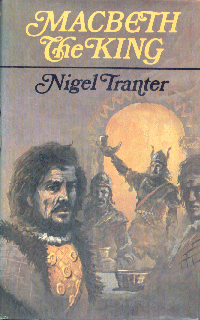

![]()
![]()
![]()
![]()

![]()
MacBeth, Son of Life is one of the best known names in literature, thanks to William Shakespeare - and to James the Sixth and First, who commissioned his great play. But as a historical person, who lived and loved and fought and reigned, he could hardly be less known and understood. The playwright's version is magnificent drama but utter nonsense as far as fact and history goes. And sadly, in the dramatic process, the character of MacBeth and still more of his great love and queen, Gruoch, have been grievously traduced, and Scotland's story hopelessly twisted.
Macbeth mac Finlay grandson of Malcolm, the Second (The Destroyer) was no savage usurper and murderer - just as his cousin "the gracious Duncan " of the play, was not a venerable, gentle monarch but a weak and foolish young man who was a disaster for Scotland, and died, not murdered, but of battle wounds.
While the Princess Gruoch, who had more right to the throne than either Duncan or Macbeth was never the female monster portrayed in Lady Macbeth, but a woman of great attraction, character and courage.
This is the tremendous story of the true Macbeth and his struggle to make and save a united Scotland, of his devotion to a greatly-wronged young woman, of the humane laws they sought to establish, the battle he was forced to fight, the ancient Celtic Church he supported against the threat of Rome and the price he paid.
To a large extent, too, it is the story of his extraordinary half brother, Thorfinn Raven Feeder, Earl of Orkney, the mighty Viking and one of the most feared men of his age.
Ranging all over Scotland, the Orcades and the Hebrides, the action also reaches to Norway, Denmark and Rome. Canute, Edward the Confessor, Siward of Northumbria, King Sven of Denmark, Pope Leo the Ninth, the Saxons and the up-and-coming Normans are among a host of vehement characters who stride across this huge and colourful canvas. Nigel Tranter has a story to tell indeed.
![]()